Intro
Discover Atorvastatin uses, a statin medication, to lower cholesterol, prevent heart disease, and reduce stroke risk, managing hyperlipidemia and hypertriglyceridemia effectively.
The world of pharmaceuticals is vast and complex, with numerous medications available to treat a wide range of health conditions. One such medication that has gained significant attention in recent years is atorvastatin, a statin medication used to lower cholesterol levels in the blood. With its widespread use and proven effectiveness, it's essential to delve into the details of atorvastatin uses, its benefits, and potential side effects. In this article, we will explore the various aspects of atorvastatin, providing readers with a comprehensive understanding of this crucial medication.
Atorvastatin is a prescription medication that belongs to a group of drugs known as statins, which work by inhibiting the production of cholesterol in the liver. By reducing the amount of cholesterol produced in the liver, atorvastatin helps to decrease the overall levels of low-density lipoprotein (LDL) cholesterol, also known as "bad" cholesterol, in the blood. High levels of LDL cholesterol can lead to the formation of plaque in the arteries, increasing the risk of heart disease, heart attacks, and strokes. Therefore, atorvastatin plays a vital role in maintaining cardiovascular health and preventing these potentially life-threatening conditions.
The importance of atorvastatin cannot be overstated, as it has been shown to significantly reduce the risk of cardiovascular events in individuals with high cholesterol levels. According to the American Heart Association, statins like atorvastatin have been proven to lower the risk of heart attacks, strokes, and cardiovascular deaths by approximately 25-30%. This is a substantial reduction, highlighting the critical role that atorvastatin plays in maintaining cardiovascular health. As we continue to explore the uses and benefits of atorvastatin, it's essential to understand the mechanisms behind its effectiveness and the various conditions it can help treat.
Atorvastatin Mechanism of Action
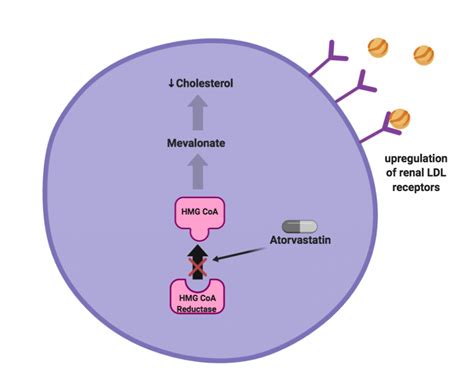
Atorvastatin works by inhibiting the enzyme HMG-CoA reductase, which is responsible for producing cholesterol in the liver. By blocking this enzyme, atorvastatin reduces the amount of cholesterol produced in the liver, leading to a decrease in LDL cholesterol levels in the blood. This, in turn, helps to slow down the formation of plaque in the arteries, reducing the risk of heart disease and other cardiovascular conditions. Additionally, atorvastatin has been shown to increase the levels of high-density lipoprotein (HDL) cholesterol, also known as "good" cholesterol, which helps to remove excess cholesterol from the bloodstream.
Benefits of Atorvastatin
The benefits of atorvastatin are numerous and well-documented. Some of the most significant advantages of using atorvastatin include: * Reduced risk of heart attacks and strokes * Lowered risk of cardiovascular deaths * Decreased levels of LDL cholesterol * Increased levels of HDL cholesterol * Improved overall cardiovascular healthAtorvastatin Uses and Indications
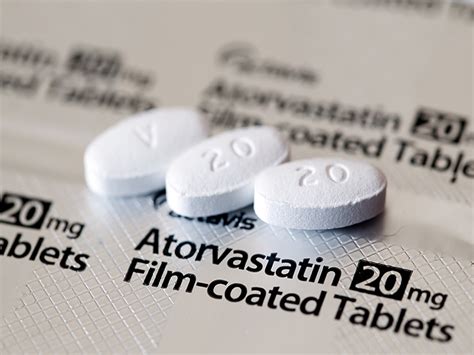
Atorvastatin is primarily used to treat high cholesterol levels, particularly in individuals with elevated levels of LDL cholesterol. It is often prescribed to patients who have tried lifestyle changes, such as diet and exercise, but have not seen significant improvements in their cholesterol levels. Atorvastatin is also used to treat other conditions, including:
- Hyperlipidemia (elevated levels of lipids in the blood)
- Hypertriglyceridemia (elevated levels of triglycerides in the blood)
- Familial hypercholesterolemia (a genetic disorder that causes high cholesterol levels)
Atorvastatin Dosage and Administration
The dosage and administration of atorvastatin vary depending on the individual patient's needs and medical history. Typically, atorvastatin is taken once daily, with or without food, and the dosage ranges from 10-80 mg per day. It's essential to follow the prescribed dosage and administration instructions carefully to ensure the safe and effective use of atorvastatin.Atorvastatin Side Effects and Interactions
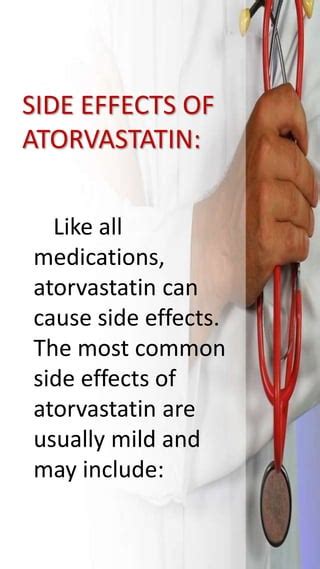
While atorvastatin is generally well-tolerated, it can cause side effects in some individuals. Common side effects of atorvastatin include:
- Headache
- Dizziness
- Nausea and vomiting
- Abdominal pain
- Muscle pain and weakness
It's essential to note that atorvastatin can interact with other medications, including:
- Blood thinners (e.g., warfarin)
- Anti-inflammatory medications (e.g., ibuprofen)
- Antibiotics (e.g., erythromycin)
- Antifungal medications (e.g., itraconazole)
Atorvastatin Warnings and Precautions
Atorvastatin is not suitable for everyone, particularly those with certain medical conditions or taking specific medications. It's crucial to discuss the following warnings and precautions with your healthcare provider: * Pregnancy and breastfeeding: Atorvastatin is not recommended for pregnant or breastfeeding women, as it may harm the fetus or baby. * Liver disease: Atorvastatin can cause liver damage, so it's essential to monitor liver function regularly. * Kidney disease: Atorvastatin may worsen kidney function, so it's crucial to monitor kidney function regularly.Atorvastatin and Lifestyle Changes
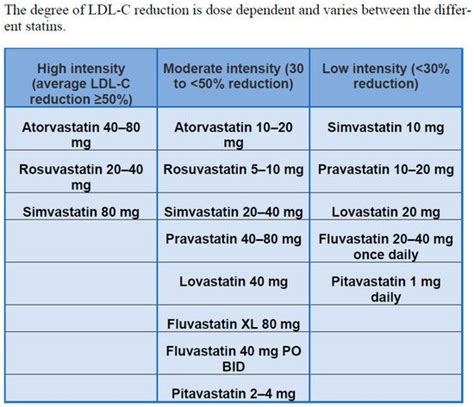
While atorvastatin is an effective medication for lowering cholesterol levels, it's essential to combine it with lifestyle changes for optimal results. Some recommended lifestyle changes include:
- Eating a healthy, balanced diet low in saturated and trans fats
- Engaging in regular physical activity, such as walking or jogging
- Maintaining a healthy weight
- Quitting smoking
- Limiting alcohol consumption
Atorvastatin and Other Medications
Atorvastatin can be used in combination with other medications to treat various health conditions. Some examples include: * Ezetimibe: A medication that helps to lower cholesterol levels by reducing the absorption of cholesterol in the gut. * Fenofibrate: A medication that helps to lower triglyceride levels and increase HDL cholesterol levels. * Omega-3 fatty acids: A dietary supplement that helps to lower triglyceride levels and reduce inflammation.Atorvastatin and Cardiovascular Health
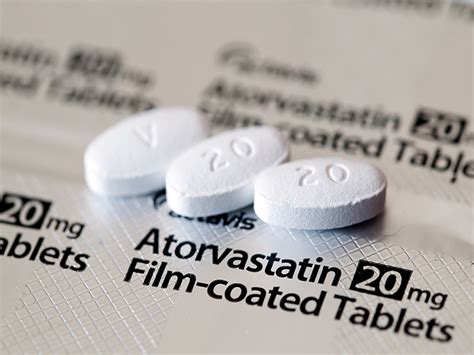
Atorvastatin plays a critical role in maintaining cardiovascular health by reducing the risk of heart attacks, strokes, and cardiovascular deaths. By lowering LDL cholesterol levels and increasing HDL cholesterol levels, atorvastatin helps to slow down the formation of plaque in the arteries, reducing the risk of cardiovascular disease.
Atorvastatin and Diabetes
Atorvastatin may also have benefits for individuals with diabetes, as it has been shown to reduce the risk of cardiovascular events in this population. Additionally, atorvastatin may help to improve insulin sensitivity, reducing the risk of developing type 2 diabetes.Atorvastatin and Kidney Disease
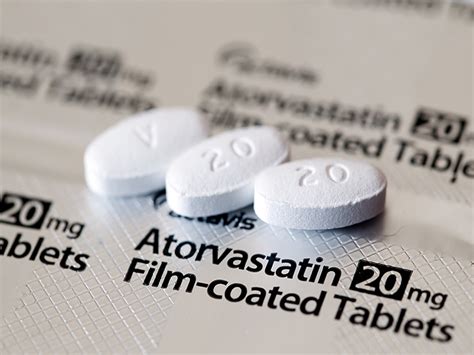
Atorvastatin may also have benefits for individuals with kidney disease, as it has been shown to reduce the risk of cardiovascular events in this population. However, it's essential to monitor kidney function regularly, as atorvastatin may worsen kidney function in some individuals.
Atorvastatin and Liver Disease
Atorvastatin may also have benefits for individuals with liver disease, as it has been shown to reduce the risk of cardiovascular events in this population. However, it's essential to monitor liver function regularly, as atorvastatin may cause liver damage in some individuals.Atorvastatin and Other Health Conditions
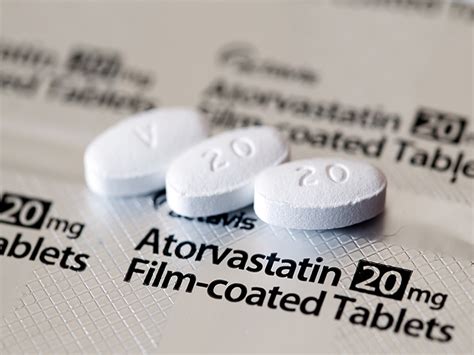
Atorvastatin may also have benefits for individuals with other health conditions, such as:
- High blood pressure
- Heart failure
- Peripheral artery disease
- Atherosclerosis
Atorvastatin and Future Directions
As research continues to emerge, it's likely that atorvastatin will play an increasingly important role in the treatment and prevention of various health conditions. Some potential future directions for atorvastatin include: * Combination therapy with other medications * Use in new patient populations, such as those with high-risk cardiovascular disease * Development of new formulations, such as extended-release tabletsWhat is atorvastatin used for?
+Atorvastatin is used to lower cholesterol levels in the blood, particularly in individuals with elevated levels of LDL cholesterol.
What are the benefits of atorvastatin?
+The benefits of atorvastatin include reduced risk of heart attacks and strokes, lowered risk of cardiovascular deaths, decreased levels of LDL cholesterol, and increased levels of HDL cholesterol.
What are the common side effects of atorvastatin?
+Common side effects of atorvastatin include headache, dizziness, nausea and vomiting, abdominal pain, and muscle pain and weakness.
In conclusion, atorvastatin is a vital medication that plays a critical role in maintaining cardiovascular health and preventing potentially life-threatening conditions. As we continue to explore the uses and benefits of atorvastatin, it's essential to remember the importance of combining this medication with lifestyle changes and other treatments to achieve optimal results. We invite readers to share their thoughts and experiences with atorvastatin, and to take action by consulting with their healthcare provider to determine if this medication is right for them. By working together, we can promote cardiovascular health and reduce the risk of heart disease and other related conditions.
